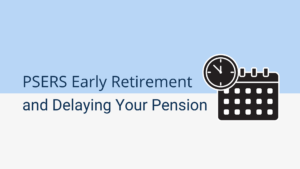*TeachersRetire is not affiliated with, endorsed or sponsored by PSERS*
Most PSERS members know they must reach some milestone of age and/or years of service to reach Normal Retirement. For T-C and T-D class members, that means working until achieving one of the following:
- Age 62
- 35 years of service in PSERS
- Age 60 and 30 years of service in PSERS
Retiring before reaching one of these milestones means retiring “Early” or under the “Special Early” status. Early retirement typically means a significant reduction in your monthly pension benefit. This varies depending on how many months you’re retiring before you would have otherwise reached Normal Retirement.
To reach Special Early Retirement, you must be at least age 55 and have at least 25 years of service. This is commonly called “Special Early 55/25”. The benefit of reaching 55/25 status is the lesser penalty for each month you’re retiring before your Normal Retirement.
Often, those who terminate PSERS employment early are leaving the education field and making a career change rather than fully retiring. If this sounds like you, you may want to consider delaying your PSERS pension. This is especially true if you plan to continue earning a sufficient income in another job. Let’s talk about why this might pay off.
Why would I defer my PSERS pension?
You don’t have to start your PSERS pension income when you terminate employment. You have the option to delay your pension payments until a later date. That time could be a few months or years from your termination date and align with your true retirement date or income needs.
The payoff for deferring your pension is reaching a better retirement status even after ending your PSERS employment. Let’s look at two examples to illustrate how this works.
Example #1- Reaching Special Early Retirement after termination
Tony is 52 years old with 25 years of PSERS service. He’s leaving his job as a teacher but plans to continue working and earning about the same income in another job. Right now, Tony’s retirement status is “Early”. If he started his pension today, he’d be locking in a significantly reduced benefit because he hasn’t reached either Special 55/25 or Normal Retirement status.
To increase his future pension, Tony could choose not to claim his PSERS benefits right now. If he delays until age 55 (3 more years), he would reach Special 55/25 status. He already has the 25 years of service. He only needs to hit the age requirement which he can do simply by waiting a few years to start his pension.
Example #2- Reaching Normal Retirement After Termination
Brenda is 58 with 32 years of PSERS service. If she retires now and starts her pension, she would have enough years (30 needed) but would not be old enough (age 60) to qualify for Normal Retirement. So, she would be retiring under Special 55/25 and have a reduction in her monthly payment.
If Brenda plans to work in another job for a few years or doesn’t otherwise need the pension income right now, she could delay her pension for two years to reach Normal Retirement. This could bump her monthly pension by several hundred dollars, if not more.
If you’re planning to work after leaving PSERS or if you simply don’t need the pension income right away, delaying your pension to hit an age milestone could make a major difference in your pension benefit.
How do I terminate employment and defer my pension?
Deferring your pension isn’t complicated. There is actually less to do than if you were retiring from PSERS completely. Let’s review this process step-by-step.
Step #1- Follow resignation procedures
Each employer has a different timeframe for when they want your resignation letter submitted. Some want a formal letter. Others might be more flexible and allow a simple email. Either way, you want to make sure you give them notice on their terms.
Step #2- Inquire about unused sick and personal days
Most PSERS employers offer a lump sum payout of your unused sick and personal days when you terminate employment. This could be as low as $25/day or up to $100/day or more. Typically, your employer will only pay out this money via a deposit into a pre-tax 403(b) retirement plan. If you already have a plan open, simply provide Human Resources the vendor and account number. Otherwise, you’ll need to open a 403(b) to receive the funds. In this case, ask HR for a list of vendors and open the account before you terminate your employment.
Step #3- Review your health insurance options
Health insurance is a big topic for almost all PSERS members terminating employment before reaching Medicare eligibility at age 65. Some (but few) employers still offer health insurance to retired employees if you have reached certain service thresholds.
Most PSERS members won’t have this as an option and will need to find coverage elsewhere. You can find a detailed explanation of the most common health insurance alternatives here.
Step #4- Contact PSERS About Your Termination
We have received conflicting information as to whether you should complete a PSERS Retirement Application or not when terminating employment but deferring your pension. Until we have more clear guidance, we recommend calling PSERS and asking how to proceed with a retirement application.
Section 11 of the retirement application tells PSERS that you’re terminating employment but you do not want to start your pension benefits right now. In this section, you elect a future date for your pension to start. If you’re delaying the pension to reach an age milestone, you’ll want to elect a start date that coincides with reaching that age. This may be the direction PSERS leads you when you inquire.
If you’re thinking about deferring your pension, a good place to start is to check your current retirement status in your Member Portal. You can also call PSERS to ask about your retirement status.
While in the Member Portal, you can use the benefit calculator to run scenarios for when you would start your pension benefits and compare them to today. This will give you a sense of how much higher your pension might be if you defer and whether it is worth it.
Once you’re ready to start your benefits, you can follow the typical PSERS retirement process by requesting a retirement estimate, attending Exit Counseling and filing your retirement application.



